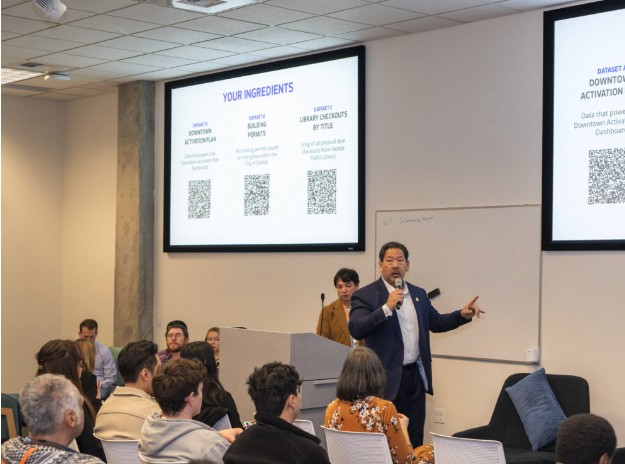
Last month, Seattle became the latest city to release a citywide data strategy as part of its work with the Bloomberg Philanthropies City Data Alliance.
Seattle’s new three-year One Seattle Data Strategy, crafted in collaboration with the Bloomberg Center for Government Excellence at Johns Hopkins University (GovEx) coaches as part of the city’s participation in the City Data Alliance, doubles down on existing best practices and explores opportunities for improvement and collaboration.
The plan has four key pillars: data quality and governance; data literacy and culture; data use and equity; and data and community engagement. Seattle Mayor Bruce Harrell announced the strategy at a data hackathon in December.
“Data has the potential to transform everything we do as a city, from how we deploy public safety resources to how we build critical infrastructure,” Mayor Harrell shared in his announcement. “Our One Seattle Data Strategy will help turn that potential into progress as we strive to serve our community effectively, efficiently, and equitably.”
Aiming to improve service delivery and identify opportunities to better serve residents, comprehensive data strategies are a key component of the City Data Alliance, which works with cities across the Americas to bolster their use of data to strengthen government operations, innovate public services, and produce better outcomes for residents.
More cities participating in the second class of the City Data Alliance are also establishing citywide data strategies, creating roadmaps for implementing effective data collection, analysis, and decision making across their agencies and staff.
“Data is one of the most critical assets public sector leaders have — and the Bloomberg Philanthropies City Data Alliance is aimed at helping cities maximize that asset for public good,” said James Anderson, who leads the Government Innovation program at Bloomberg Philanthropies. “We applaud Seattle for their work to advance and codify a citywide data strategy—engaging community members through the process—which will enhance their ability to effectively problem solve across city hall and sectors, and target interventions that deliver on resident needs.”
The Bloomberg Philanthropies City Data Alliance works with cities across North, Central, and South America with populations of 100,000 or more to improve their use of advanced data practices to better resident outcomes. To date, 42 cities across seven countries have been accepted into the City Data Alliance.



